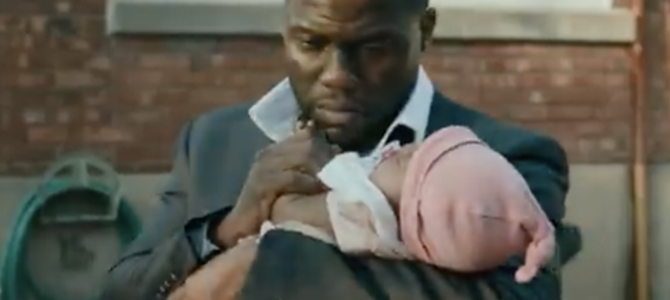
Hollywood spares no expense promoting broken families, gender fluidity, and careerism. Yet Kevin Hart’s new Netflix movie, “Fatherhood,” is different.
Based on a true story, the movie depicts the life of Matthew Logelin (played by Hart), right after he loses his beloved wife. While still grieving, Matthew raises his newborn daughter, Maddy, as a single parent.
Matthew believes in the importance of fatherhood with all his being, and he lives by it. His dedication to his daughter enables him to slowly resume living.
Even before his daughter can talk, Matthew is constantly explaining things to Maddy as if she’s an adult. Rather than waste time scrolling through his phone, he looks his daughter in the eye and confides in her. When he tucks her in at night, he always gives her two kisses—one for him, and one “for Mommy.”
Of course, fatherhood isn’t easy. Matthew and his funny friends struggle to play basketball while Maddy cries on the sidelines. The men bicker over how to fasten her carseat. And years later, they all play Sunday poker with Maddy for cookies; at that point, the struggle is no longer a crying baby, but the fact that Maddy is so sly that she often beats the men (who adore her).
The success of Matthew’s parenting isn’t defined by the comedic moments when he messes up, but by the countless times he keeps going.
Children raised in fatherless homes are nearly four times more likely to be impoverished. Sixty-three percent of youth suicides occur in fatherless households, and approximately 71 percent of high school dropouts come from fatherless homes. Moreover, children who have grown up without a strong male role model are at a significantly higher risk of resorting to alcohol and drug abuse.
Matthew doesn’t need these statistics to know the role he plays in his daughter’s life is crucial. He recognizes that Maddy relies on his protection and moral guidance, as well as his friendship.
However, while “Fatherhood” is (quite obviously) about fatherhood, it is also about motherhood. Matthew deeply mourns that Maddy grows up in a household without her mother, and constantly worries that he’s not doing enough to fill the shoes of his wife.
Meanwhile, Maddy mourns the loss of her mother. She tells her dad that they “need more people.” She doesn’t just mean any random people. Her dad’s friends always come over to their lively house on “poker Sundays,” and she loves them, but they’re not women. As Maddy’s grandma says, “[She] need[s] a woman in her life.”
As the credits roll, Matthew therefore wears a skirt to drop Maddy off at her strict Catholic school. But wait—it’s not what you’re thinking.
Yes, Maddy is defying the school’s traditional uniform by wearing pants (something she’s been reprimanded for throughout the movie). And yes, Matthew is, indeed, wearing a long plaid uniform skirt. It’s awkward, and the nuns aren’t pleased.
However, this isn’t the moment for an eye-roll, nor is it the dismantlement of traditional gender norms that it might first appear to be. Lefties might want to interpret the scene that way, but such an interpretation would miss the point. The “skirt scene” isn’t about gender politics so much as it’s a reaffirmation of the uniquely valuable contributions men and women both make in children’s lives.
By the end of the movie, Maddy is no longer this wild child craving a motherly, feminine influence. If that were still the case, the scene would be heartbreaking.
Instead, the “skirt scene” occurs when Maddy is finally benefiting from strong female role models in her life, such as her grandma and her dad’s new girlfriend (affectionately nicknamed Swan). Rather than continue to reject femininity out of anger over losing her mother, Maddy celebrates that she’s finally surrounded by strong role models of both masculinity and femininity.
Meanwhile, after years of trying to simultaneously “achieve” motherhood and fatherhood, Matthew is finally comfortable knowing he’s a father, and a phenomenal one at that.
When Matthew wears a skirt, the scene is funny—precisely because it’s such a sharp mockery of his former, misguided views. Matthew initially thought he had to be both “the woman” and “the man” in his household, and he spent countless hours worrying that he was failing at both.
Matthew eventually learns that he doesn’t have to fulfill both roles. The movie illustrates that men and women, by virtue of being themselves, give each other strength. Swan enables Matthew to be a better father. And Swan and Matthew, together, enable Maddy to become a better woman.
The fact that Maddy benefits from having strong men and women in her life isn’t a sign of her father’s weakness. It’s a testament to Matthew’s own parenting that, in the face of great loss, he’s raised such an incredible daughter.
Moreover, it’s a testament to Matthew’s own healing and persistent compassion that he’s willing to make himself vulnerable once more, in order to share his life and the life of his daughter with others. Lesser men would have walked away, but Matthew shoulders the burden of crafting a happy home for his little girl. Unsurprisingly, this “burden” soon becomes the greatest blessing of his life.
When Matthew is eventually promoted to fill his boss’s shoes, and it’s time for him to choose between his career and his daughter, his decision is easy. He chooses her.
For this reason, “Fatherhood” is an outlier from the usual leftist script. And in the face of what Hollywood usually communicates, that’s refreshing.









